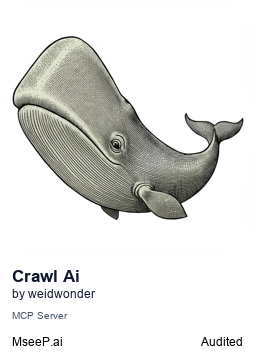About
A fast, asynchronous MCP server that provides multi‑engine web search (DuckDuckGo and Google) and LLM‑friendly content extraction, converting webpages into concise, citation‑rich Markdown for AI assistants.
Capabilities

Overview
The Crawl4AI MCP Server is a specialized Model Context Protocol (MCP) service that equips AI assistants with robust web‑search and LLM‑optimized content extraction capabilities. By bridging external search engines—DuckDuckGo by default, and Google via API key—with intelligent parsing of web pages, the server resolves a common bottleneck for AI systems: acquiring reliable, source‑referenced information from the open internet in a format that large language models can ingest efficiently.
Developers using AI assistants often need to retrieve up‑to‑date facts, browse multiple sources, and present concise, citation‑ready content to the model. Crawl4AI addresses this by offering two core tools:
- search – Executes queries across one or more search engines, returning structured results that include abstracts, URLs, and related topics. The tool supports DuckDuckGo (no API key required) and Google (with optional API credentials), allowing users to combine engines for breadth or precision.
- read_url – Fetches a target page and transforms it into LLM‑friendly markdown with optional inline citations. The server automatically strips navigation bars, ads, and other noise, preserving only the substantive article body and its source URLs. Multiple output formats (e.g., , ) let developers tailor token usage and readability.
These capabilities are built on FastMCP, ensuring high‑performance, asynchronous handling of concurrent requests—a critical requirement when AI assistants need to pull multiple search results or read several pages in parallel.
Value for Developers
- Efficient Knowledge Retrieval – By returning clean, citation‑rich markdown, the server reduces token overhead for downstream LLM processing.
- Source Transparency – Inline citations preserve the provenance of each fact, enabling AI assistants to reference URLs explicitly and improving user trust.
- Multi‑Engine Flexibility – Combining DuckDuckGo’s privacy‑first search with Google’s precision allows developers to balance coverage and relevance without reimplementing adapters.
- LLM‑Optimized Content – The server’s noise filtering and length optimization (minimum token threshold, removal of redundant sections) mean that models receive only the most informative text, improving reasoning accuracy.
Use Cases
- Research Assistants – A research chatbot can query academic topics, retrieve the top results, and present a concise summary with citations for quick verification.
- Customer Support Bots – When users ask about product updates, the bot can search official documentation sites and return a clean FAQ‑style answer.
- Content Generation Pipelines – Writers or marketers can feed the server with URLs to generate blog outlines, ensuring each paragraph is backed by a source.
- Education Tools – Tutors can prompt the server to fetch up‑to‑date educational content and present it in a structured, reference‑rich format for students.
Integration with AI Workflows
The server exposes its tools via standard MCP endpoints, making it a drop‑in component for any AI assistant that already speaks the protocol. A typical workflow involves:
- Query – The client calls with a user prompt, receiving URLs and summaries.
- Fetch – For each relevant URL, the client invokes , specifying a format that balances detail and token budget.
- Synthesize – The assistant composes a response, integrating the extracted markdown and inline citations directly into its output.
Because the server is asynchronous and stateless, it scales horizontally behind a load balancer or within container orchestration platforms, fitting neatly into cloud‑native AI stacks.
Unique Advantages
- Zero‑Configuration Search – DuckDuckGo requires no API key, enabling immediate use in privacy‑conscious environments.
- LLM‑Centric Output – Formats like are engineered for prompt engineering, reducing the need for custom post‑processing.
- Open Source Foundation – Built on top of the Crawl4AI extraction library, the server inherits proven web‑scraping techniques while adding MCP compatibility.
- Rapid Deployment – The server can be installed locally or via the Smithery CLI, allowing developers to integrate it into their Claude desktop client with a single command.
In sum, the Crawl4AI MCP Server delivers a turnkey solution for AI assistants that need reliable, citation‑ready web content. By combining multi‑engine search with LLM‑optimized extraction in a fast, MCP‑compliant package, it empowers developers to build richer, more trustworthy conversational agents.
Related Servers
MarkItDown MCP Server
Convert documents to Markdown for LLMs quickly and accurately
Context7 MCP
Real‑time, version‑specific code docs for LLMs
Playwright MCP
Browser automation via structured accessibility trees
BlenderMCP
Claude AI meets Blender for instant 3D creation
Pydantic AI
Build GenAI agents with Pydantic validation and observability
Chrome DevTools MCP
AI-powered Chrome automation and debugging
Weekly Views
Server Health
Information
Explore More Servers
Skyfire MCP Server
AI‑powered payments via Skyfire API
gpt2099
Scriptable AI in Nushell with persistent, editable conversations
Jupiter MCP Server
Execute Solana token swaps via Jupiter Ultra API
OpenAI Agents Chat Demo Server
Intelligent chatbot with custom tool integration
ToDo App MCP Server
Simple task management for quick to-do lists
PyPI Query MCP Server
Fast, async PyPI package querying and dependency analysis